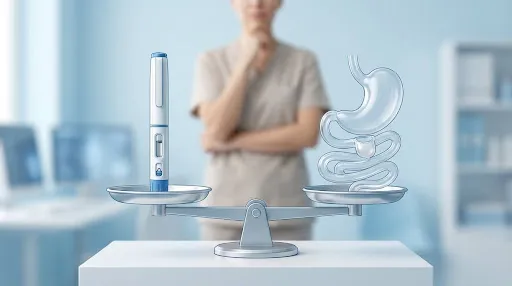Benadryl starts working within thirty minutes, lasts four to six hours, and stays in your system up to two days, depending on age, dosage, and metabolism. |
You know that feeling, your nose won’t stop running, your eyes itch, and your skin feels like it’s been in a fight with pollen. You grab Benadryl, swallow it, and wait for relief.
But somewhere between the first sneeze-free sigh and the next wave of drowsiness, one thought shows up: how long does Benadryl last? Understanding its timing helps you manage symptoms without overdoing doses. Let’s go over what the experts say and how your body actually processes it.
How Long Does Benadryl Last in the Body
Benadryl, also called diphenhydramine, is a quick but short-acting antihistamine. It starts working fast and fades before the day ends. The Benadryl duration of action is usually four to six hours, depending on your age and health. The terminal elimination half-life in adults averages nine hours, based on 2024 NIH clinical data. That means it takes roughly nine hours for your body to clear half the dose, though the noticeable effects fade earlier.
Most people experience full symptom relief within half an hour of taking it. In kids, the effects wear off sooner because their metabolism is faster. In older adults, they linger longer, sometimes for eight hours or more. The medicine’s short action is why it’s taken several times a day for ongoing allergies.
Group | Onset Time | Duration of Relief | Average Half-Life |
Children | 15–30 minutes | 3–5 hours | 5.4 hours |
Adults | 15–30 minutes | 4–6 hours | 9 hours |
Seniors | 20–40 minutes | 6–8 hours | 13.5 hours |
In practice, you stop feeling congested, but a trace amount of diphenhydramine keeps circulating quietly inside your body.
How Long Does Benadryl Stay in Your System
Here’s where timing meets biology. Even when the sneeze relief wears off, Benadryl keeps circulating. The Benadryl pharmacokinetics data show it can stay in your system for up to 60 hours (2.5 days) in healthy adults. For children, it’s about 35 hours, while seniors can retain it for nearly 90 hours (four days).
The difference lies in metabolism speed. Only about 4% of the medicine leaves the body unchanged through urine. The rest is broken down by the liver, a process known as Benadryl liver metabolism, before being excreted.
Approximate detection windows are:
Urine: 1–2 days
Blood: up to 24 hours
Saliva: about 12–18 hours
The Benadryl elimination half-life is slower in older adults and those with liver concerns. That’s why even after the itching fades, some still feel a lingering foggy tiredness. While the effects last only six hours, traces stick around for days, proof that the body’s clearance process takes its time.
Benadryl vs Newer Antihistamines: Duration Comparison
While Benadryl works fast, newer antihistamines last longer. Compare them side by side:
Medication | Onset | Duration | Sedation |
Benadryl (Diphenhydramine) | 15–30 min | 4–6 hrs | High |
Cetirizine (Zyrtec) | 1 hr | 24 hrs | Mild |
Loratadine (Claritin) | 1–3 hrs | 24 hrs | Minimal |
Fexofenadine (Allegra) | 1–2 hrs | 24 hrs | None |
Benadryl still holds value for quick allergy rescue or short-term use, but for daily management, the others win for convenience and alertness.
How Long Does It Take for Benadryl to Work
People like quick fixes, and Benadryl answers fast. So, how fast does Benadryl work? Usually, within 15 to 30 minutes, depending on how it’s taken. The Benadryl onset and peak time happen around one to three hours after a dose. Liquids are absorbed more quickly than tablets, while capsules take longer to digest.
Still, how long does diphenhydramine last? The answer depends on its form and your body type. For most adults, effects last four to six hours, matching the dosing schedule. In a few, it fades slightly sooner.
To make it clearer:
Tablets/Capsules: Relief in 30 minutes, lasting four to six hours.
Liquid form: Kicks in within 15 minutes, slightly shorter action.
Chewables: Start quickly but taper faster.
If your symptoms persist, resist the urge to redose early. Too much diphenhydramine can cause dizziness, confusion, or dry mouth. For allergy flares that last all day, doctors may suggest longer-acting antihistamines like cetirizine or loratadine.
Factors That Affect How Long Benadryl (Diphenhydramine) Lasts
Even though the label says four to six hours, that’s not fixed for everyone. Here’s why.
First, metabolism. People process drugs at different rates, especially as they age. The Benadryl half-life varies between 5.4 hours in children to 13.5 hours in older adults. A 2023 pharmacology report also showed that those with liver issues experienced an extended elimination time of close to 15 hours.
Second, dosage and timing. Taking higher doses or dosing too close together extends the Benadryl active duration, often increasing grogginess.
1. Age and Metabolism
Younger people break it down faster, meaning shorter relief. Older adults retain it longer, which can stretch sedation effects.
2. Liver and Kidney Health
Slow liver function delays Benadryl elimination rate, making the effects stronger and longer. Doctors often recommend smaller doses for those with chronic conditions.
3. Hydration and Body Weight
More body mass can slightly extend relief because of drug distribution across tissues. Staying hydrated supports faster clearance.
4. Other Medications
Mixing Benadryl with alcohol, antidepressants, or muscle relaxants increases sleepiness and slows metabolism.
5. Time of Use
Nighttime doses feel heavier, while morning doses can leave you tired through lunch. Spacing them wisely prevents stacking fatigue.
How Long Does Benadryl Make You Sleepy
Benadryl’s drowsiness effect outlives its allergy relief. The Benadryl effects duration for sedation averages six to eight hours, often stretching longer in older adults or those sensitive to medications.
The reason? Diphenhydramine easily crosses into brain tissue, where it interacts with receptors responsible for wakefulness. Once there, it slows reaction time and causes heavy eyelids. A 2023 clinical pharmacology review noted that about 30% of participants still felt groggy eight hours after taking it.
To manage that:
Take Benadryl at least 30 minutes before bed.
Avoid pairing it with alcohol or sedatives.
Drink enough water to support diphenhydramine excretion time.
If you’re asking how long Benadryl drowsiness lasts, the realistic range is 6–10 hours, depending on the dose and timing. For older adults, it can feel like it lasts half the next day.
Side Effects of Benadryl
While taking Benadryl, keep a watch over the potential side effects to prevent further complications due to its lasting effects.
Common side effects:
Constipation
Drowsiness
Upset stomach
Dry mouth
Headache
Serious side effects:
Pounding heartbeats
Lightheadedness
Confusion
A fluttering feeling in the chest
Painful or trouble urination
Less or no urination
Tightness in the neck or jaw
Uncontrollable movements of the tongue
If you experience any symptoms, immediately seek professional help.
How To Quickly Get Rid of Benadryl Effects?
If you are taking Benadryl and want to prevent its side effects, follow these tips:
Stay Hydrated: Drink a lot of water to quickly flush out the drug from the system via urine.
Practice Light Exercise: Engage in walking or physical activities to boost your metabolism, helping the body with effective drug processing.
Consume Nutritious Foods: Add lean protein, whole grains, vegetables, and dairy products to your diet to support the body's detox process.
Avoid Alcohol & Other Drugs: Avoid them to prevent prolonged drowsiness or increase the risk of side effects.
Get Fresh Air: Getting fresh air can make you more alert when Benadryl's sedative effects wear off.
Be Patient: Maintain patience as Benadryl’s effects naturally subside within 4 to 6 hours.
Note: If symptoms worsen or persist, see a doctor as soon as possible!
Tips to Safely Take Benadryl
Even over-the-counter medicines demand respect. The FDA guidelines for diphenhydramine use suggest adults take 25–50 mg every four to six hours, never exceeding 300 mg per day.
To stay safe:
Skip alcohol and sleep aids on the same day.
Avoid driving until you’re fully alert.
Don’t mix it with other allergy medications that already contain diphenhydramine.
If symptoms last more than three days, consult a doctor.
Long-term use for sleep isn’t ideal. Tolerance builds fast, reducing effectiveness and leading to reliance. Occasional doses are fine, but for ongoing sleep issues, talk to a professional about better long-term options.
When to See a Doctor
Call your doctor if you still feel sedated 12 hours after taking Benadryl or if allergic symptoms don’t improve after two days. Also, reach out if you experience dizziness, confusion, or irregular heartbeat.
People with chronic liver or kidney issues should get advice before taking any antihistamine. Sometimes, adjusting the dose or switching to a non-drowsy version makes all the difference.
Final Thoughts
So, how long does Benadryl last? About four to six hours for most, though the traces stay longer. It’s quick to act, reliable for short-term relief, and a trusted choice for decades.
Just remember: short bursts of use are fine, but for daily allergy management, switch to newer 24-hour options that let you stay clear-headed and active. Always follow your doctor’s guidance before regular use.
Read Also: How Long Does Valium Last?
أسئلة متكررة
How long does 25mg of Benadryl take to wear off?
After 6 hours, the effect of Benadryl wears off as the body metabolizes it.
How long does Benadryl last for allergies?
Typically four to six hours. Some people feel it sooner, fading, others longer, depending on hydration, body weight, and general metabolism speed.
How long does Benadryl last for sleep?
Usually around six to eight hours. Older adults sometimes feel groggy longer because their bodies take extra time to clear it.
How long does Benadryl last in adults vs children?
Adults usually feel relief for four to six hours, while children’s effects fade after three to four hours due to faster metabolism.
How long does Benadryl stay in your system for a drug test?
Detectable for up to two days in urine and about twenty-four hours in blood, depending on hydration and health.
What affects how long Benadryl lasts?
Age, liver health, dosage, hydration, and other medicines can change how long Benadryl stays active in the body.
-User-1754380331.png)
كُتب بواسطة







